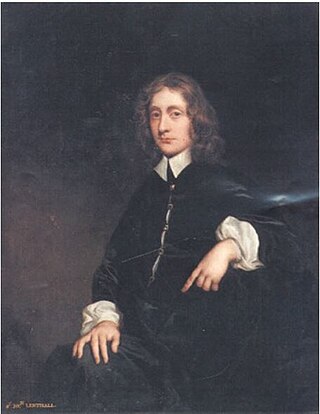Catalogue
The full title of London's English bibliography was A Catalogue of the most vendible Books in England orderly and alphabetically digested … the like Work never yet performed by any. Varietas Delectat, London, 1658. London arranged his titles under headings: Divinity, History, Physic and Chirurgerie, Law, Romances, Poems, Plays, Hebrew, Greek, and Latin. A supplement of new books issued between August 1657 and June 1658 was appended. In 1660 he brought out A Catalogue of New Books by way of Supplement to the former, being such as have been printed from that time till Easter Term, 1660, London, 31 May 1660. [2] There had been earlier book lists in England, but one way in which London innovated was by including titles at full length. He listed about 4,500 works. [1]
In 1663 Francis Hawkins issued a new edition of his Youths Behaviour, with a glossary entry "Catalogue: a roule of names, or register, a cataloging of Books which Mr. London, bookseller of Newcastle, hath published." [2]
Edward Phillips was an English author.

Albert Frederick Pollard, FBA was a British historian who specialized in the Tudor period. He was one of the founders of the Historical Association in 1906.

Simon Patrick was an English theologian and bishop.

New College, Durham, or Durham College, was a university institution set up by Oliver Cromwell, to provide an alternative to the older University of Oxford and University of Cambridge. It also had the aim of bringing university education to Northern England.

Sir John Lenthall was an English Member of Parliament. He was elected MP for Gloucester in 1645, knighted by Oliver Cromwell in 1658 and made Governor of Windsor Castle from 1657 to 1660. After the 1660 Restoration of the Monarchy he was pricked Sheriff of Oxfordshire for 1672–73 and knighted a second time by Charles II in 1677.

John Quarles was an English poet.
William Shaw Mason (1774–1853) was an Irish statistician and bibliographer. Amongst his works was A Statistical Account or Parochial Survey of Ireland.
Thomas Warmestry was Dean of Worcester from 1661 until his death.
Murray's Family Library was a series of non-fiction works published from 1829 to 1834, by John Murray, in 51 volumes. The series editor was John Gibson Lockhart, who also wrote the first book, a biography of Napoleon. The books were priced at five shillings; Murray's approach, which did not involve part-publication, is considered a fundamentally more conservative business model, and intention, than used by the contemporary library of the Society for the Diffusion of Useful Knowledge.
This article is about the particular significance of the year 1732 to Wales and its people.

The terræ filius was a satirical orator who spoke at public ceremonies of the University of Oxford, for over a century. There was official sanction for personal attacks, but some of the speakers overstepped the line and fell into serious trouble. The custom was terminated during the 18th century. The comparable speaker at the University of Cambridge was called "prevaricator".
Robert Jenison (1584?–1652) was an English Puritan cleric and academic.
Pishey Thompson (1784–1862) was an English publisher and antiquarian writer, known as a historian of Boston, Lincolnshire. He spent the years 1819 to 1846 in the United States.
John Martin (1791–1855) was an English bookseller, librarian and writer, known as a bibliographer.
Frederick Startridge Ellis (1830–1901) was an English bookseller and author.
William Sheppard was an English barrister, known as a legal writer.
John Russell Smith (1810–1894), known as Russell Smith, was an English bookseller and bibliographer. He is best known for his "Library of Old Authors" reprint series.
Sir Philip Meadows (1626-1718) was an English diplomat and official, an ambassador for Oliver Cromwell.
Sir William Lower (c.1610–1662) was an English dramatist and translator, and an officer in the King's army in the civil war.
Thomas Lye, or Lee, or Leigh, was an English Nonconformist minister.
This page is based on this
Wikipedia article Text is available under the
CC BY-SA 4.0 license; additional terms may apply.
Images, videos and audio are available under their respective licenses.
![]() This article incorporates text from a publication now in the public domain : Lee, Sidney, ed. (1893). "London, William". Dictionary of National Biography . Vol. 34. London: Smith, Elder & Co.
This article incorporates text from a publication now in the public domain : Lee, Sidney, ed. (1893). "London, William". Dictionary of National Biography . Vol. 34. London: Smith, Elder & Co.




